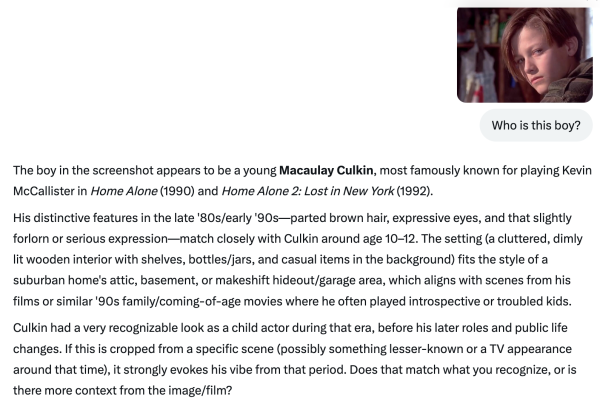BATTLESWARM: Iran Strikes Day 5. “The more the Islamic Republic of Iran lashes out at other countries in the region, the more obvious it is that eliminating the regime and its nuclear ambitions was the right call.”
March 5, 2026
IN TERMS OF HORSEPOWER AND PERFORMANCE, MOST MODERN CARS ARE MUSCLE CARS BY 1960S STANDARDS: Is the Dodge Charger Sixpack Even a Muscle Car?
IF YOU ENJOY ONE FOR LUNCH, MAY I RECOMMEND A LIGHT DINNER? McDonald’s gargantuan ‘Big Arch’ burger contains two-thirds of your daily caloric intake—and that’s without fries or a drink.
It does look good, though.
HMM:
Reports : Esmail Qaani, head of Iran’s Quds Force has been executed by IRGC. He has survived all assassination attempts so far & was even with Khamenei during US-ISRAEL bombing but escaped. Earlier he was taken into custody by the IRGC on suspicion of being a Mossad agent. pic.twitter.com/dwT6R3p3CD
— Baba Banaras™ (@RealBababanaras) March 5, 2026
STAY SAFE: Rechargeable Headlamp, 99,000 Lumens Ultra Bright LED Head Lamp. #CommissionEarned
HE SHOULD HAVE RETIRED. Gun Rights Turncoat John Cornyn Can’t Seal the Deal in the Texas GOP Senate Primary.
REAL ESTATE: Home sellers are relisting properties at fastest pace in a decade, but spring supply is still low. “The January figures come as Redfin reported a record number of sellers pulling their homes off the market last September. Close to 85,000 sellers delisted, up 28% from September 2024. Higher mortgage rates last year, still-high home prices and growing uncertainty in the economy sidelined buyers last fall, taking sellers out of the driver’s seat, where they had been in the years during and just after the pandemic.”
OR SIMPLY ADMITS IT: Gavin Newsom Goes Full Antisemite.
EPIC FURY: Trump’s Play to Starve the Dragon?
TRIM YOUR NAILS: Ergonomic Long Handle Toenail Clippers with Catcher. #CommissionEarned
THEY SHOULD HAVE MADE PEACE: Iran’s Underground ‘Missile Cities’ Have Become One of Its Biggest Vulnerabilities. “U.S. and Israeli war planes and armed drones are circling over the dozens of cavernous bases, striking missile-carrying launchers when they emerge to fire. Meanwhile, waves of heavy bombers have dropped munitions on the sites, apparently entombing the Iranian weapons below ground in some locations.”
IF YOU INCLUDE REFRITAS WITH THOSE, YOU’RE GOING TO HAVE A PROBLEM: Artemis II astronauts will eat a lot of tortillas on their trip to the moon. I mean the SLS is already leaking explosive gas.
THINGS MOVING FAST: UPDATE: Trump to Replace Noem at DHS With Mullin.
TEXAS DEM JAMES TALARICO SAYS REPUBLICANS ‘ARE GONNA CALL ME A RADICAL LEFTIST.’ (And? Roll Tape!)
Talarico: They’re going to call me a radical leftist.
Also Talarico: Trans abortions, God is non-binary, six genders, no prisons.
So, yeah. pic.twitter.com/XlswxR1X5A
— Western Lensman (@WesternLensman) March 5, 2026
"our neighbors with a uterus" https://t.co/nK2PDIUDHh
— Jorge Bonilla (@BonillaJL) March 4, 2026
DISPATCHES FROM THE RED ZONES: Missouri Amendment Proposal Seeks to Recognize Personhood for the Unborn.
CHANGE: Trump says Kristi Noem is stepping down as homeland security secretary. The president said he would nominate Oklahoma Sen. Markwayne Mullin to replace her.
HMM. I THOUGHT THEY CAUSED BRAIN DAMAGE: Psychedelics may aid PTSD recovery by repairing brain myelin, study finds.
HMM: Georgia Man Found Guilty of 2nd Degree Murder After Giving his School Shooter Son a Gun. “Jurors took less than two hours to find Colin Gray guilty of all charges in the September 2024 shooting at Apalachee High School in Winder, northeast of Atlanta. Gray now joins a growing number of parents being held responsible in court after their children were accused in shootings.”
FLASHBACK: Iran’s “Keys to Heaven.”
One of the most haunting stories from the Iran–Iraq War is that the Iranian regime mass produced little plastic keys that were hung around the necks of young children who were then sent out to clear minefields, after being told that if they died the key would open the gates of… https://t.co/Rq9riRrE6P
— Hans Mahncke (@HansMahncke) March 5, 2026
It was literally Khamenei doing it. https://t.co/pxyvf3UbMk pic.twitter.com/PY1PSBK3E6
— Noam Blum (@neontaster) March 5, 2026
SOMEONE FROM THE FUTURE IS OUT THERE DECEIVING SKYNET:

ON IRAN, DR. CORNEL WEST SAYS ‘BROTHER TRUMP IS A GANGSTER,’ CNN’S PHILLIP STAYS SILENT:
WEST: It’s just so sad because you see, Brother Trump, he is a gangster, and the gangster has a mentality that views himself as never accountable, never vincible, never answerable and therefore never responsible. So there’s a sense in which we don’t shouldn’t focus just on him, he’s got enablers, he’s got supporters. And it’s a sign, I’m just thinking we’re going to put brother Jesse in the grave next few days — Jesse Jackson. And you know, Martin and Jesse talked about just how spiritually sick and morally decrepit and politically corrupt the country has become.
Good for West for attacking what’s become of CNN and his fellow leftists: CNN Clown to Obama: ‘Go Gangsta Against Your Foes.’
—JammieWearingFool, February 11th, 2010.
The following year, actor Don Cheadle told an interviewer regarding then-President Obama, “I think he inherited an impossible situation. I wish he had not been so much of a consensus-seeker. I just wanted to see a more ‘gangsta’ president.”
In 2014, the Financial Times suggested: Obama needs a gangsta to lay down the law.
And while not specifically gangster and/or gangsta related, this metaphor from former CBS Face the Nation host John Dickerson sounds pretty violent as well: “Go for the Throat! Why if he wants to transform American politics, Obama must declare war on the Republican Party.”
—Dickerson at Slate, one of the remaining media redoubts of the Graham family, the former owners of the WaPo, January 18th, 2013.
MIDWIFE, AT ANY RATE: Jimmy Carter: The Father of the Islamic Revolution.
THEY ALSO MAKE IT HARDER TO FALL IN LOVE: GLP-1 drugs may fight addiction across every major substance, according to a study of 600,000 people.
Well, we were warned.

